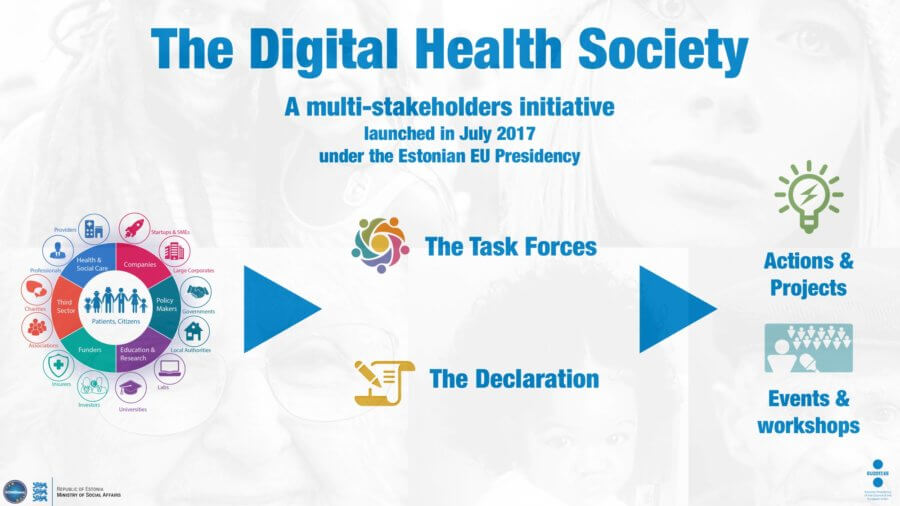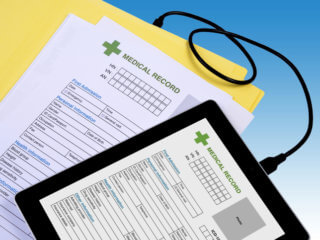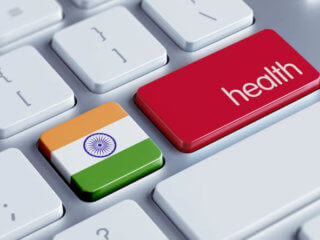Digital Health Society Declaration by the EU: An Overview
Introduced by Estonia, the current chairman of the European Union (EU), the Digital Health Society (DHS) is a multi-stakeholder initiative which aims at deploying digital health among all the member nations of the EU sustainably and tangible. There are three major components of DHS – the DHS Declaration, DHS Task Forces and the DHS event that was organised in October 2017 in Tallinn.
The DHS Declarations outlines the scope of DHS, lists the challenges in implementation, and takes inputs from multiple stakeholders to agree on ways to resolve those problems and achieve the objectives. Every entity who would be impacted by the Declaration has been made a signatory to it. This list of stakeholders includes government/policymakers/regulators, citizens/patients, healthcare providers/insurers, investors, and all other institutions associated with healthcare. All these stakeholders are not just the end users of this declaration, but they have made useful inputs during the creation of this document.
There are more than 70 signatories to this report, including Ministries of Health in Ireland and Netherlands, University of Maastricht, eHealth Brussels, Vaccines Europe, Greek Network EIP on AHA, European Brain Council etc.
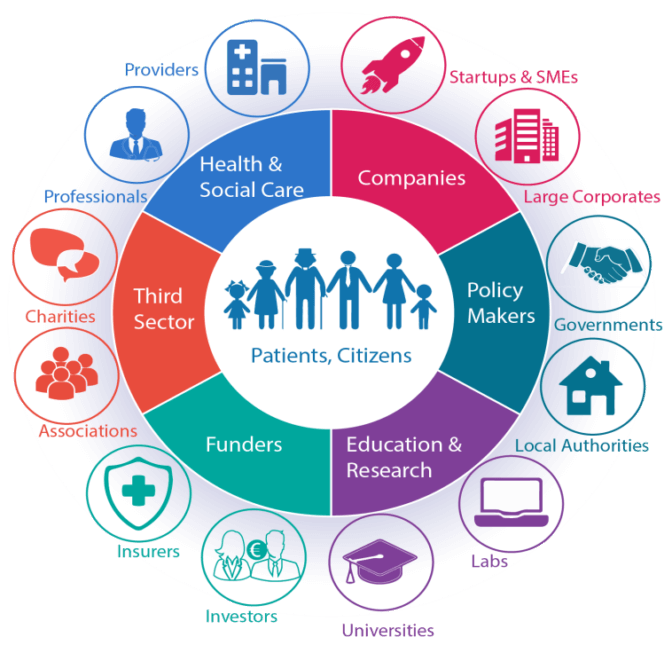
Image courtesy of DHS Declaration Document
What does it mean for patients and citizens?
One of the founding principles of the Digital Health Society Declaration is to encourage the free flow of data. Patient-centric is the watchword for this declaration.
Better use of data will allow citizens to understand their ailments and the required treatments better. This way citizens can take charge of their health and take steps to ensure that they can get right quality health coverage at the lowest prices.
Digital health will also allow medical practitioners to give personalised advice and diagnosis to the citizens, instead of going for a one-size-fits-all approach. The use of digital space will remove barriers to accessing health coverage, which earlier was possible only by physical presence. In line with the move towards freely available data and information, digital health will also remove the constraint of incomplete details when citizens attempt to seek health coverage. Already we are seeing an increasing trend of people worldwide, opting for digital solutions provided by governments, in the UK for instance, as the chart below shows.
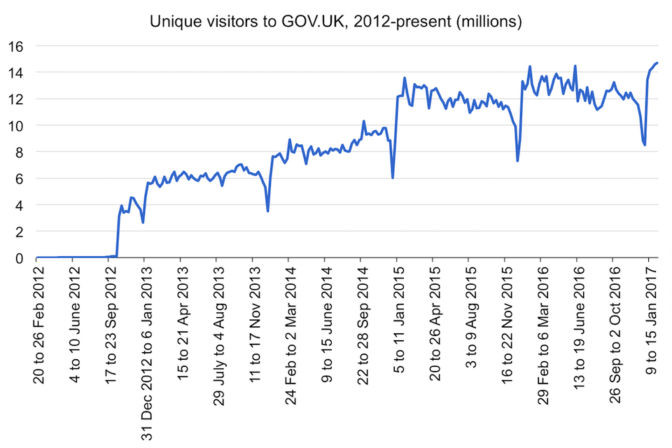
Image courtesy of UK Government
| Recommended for you | |
| Delivering impactful and well-being digital health solutions in Europe | |
| Interoperability in digital health sector | |
| The new European medical device regulation |
How does it affect health insurance startups?
Startups, by their very nature, rely on the digital means for providing their services. The Digital Health Society declaration also aims to make health services and coverage available digitally. Therefore, the DHS Declaration fits in nicely with the way startups are trying to improve the services provided by traditional health insurance companies. Startups are making health insurance information and data easily accessible to their customers, and the DHS declaration is also committed to ensuring the free flow of information.
These startups, by their efficient use of historical and real-time data specific to each patient, can move ahead to providing preventive care (in advance) rather than diagnostic care (after the patient is afflicted). By enrolling as a signatory to the declaration, startups operating in Europe can get a convenient vehicle to increase their market share.
No wonder this will give them first mover advantage and also provide access to the resources of several governments and private bodies who are also signatories. They would also be able to reach out quickly to all the citizens who uphold the declaration of DHS. Below is a view of some of the startups which are already aligned to the Digital Health initiative in Europe.
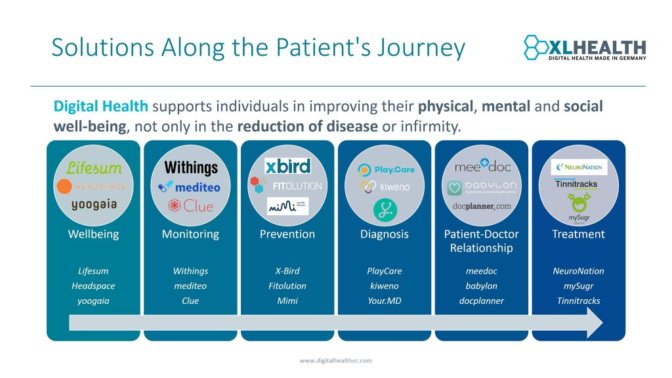
Image courtesy of Digital Health
What opportunities does DHS have for policymakers?
One of the main reasons for government to be engaged in providing health care or health coverage is to ensure that there is an equitable distribution of medical facilities, and no citizen is deprived of the opportunity to protect his family and himself.
But in this effort for equality, the efficiency of delivered health coverage often suffers, since healthcare or health insurance is not the core competency of the government or lawmakers.
Since the Digital Health Society has all categories of stakeholders involved, it will provide policymakers with a chance to take the help of other stakeholders to drive efficiencies in the system.
One of the primary reasons why health insurance startups have so far embraced only the delivery and data analytics side of health insurance, and not too many startups have taken up the underwriting and risk coverage part of protection. They have tended to depend on partnerships with traditional insurers for that. The reason is that health insurance has several regulatory nuances which need to be kept in mind by the insurer. With the advent of the DHS declaration, health insurance startups will quickly find resources to develop expertise in full risk coverage and therefore will be able to offer the coverage at a better price.
Barriers to growth of digital health in Europe
Although the European Union represents a single body, it consists of a large number of small and significant countries. Therefore, there are some constraints to the eHealth or Digital Health initiative that is envisaged by the DHS Declaration.
There needs to be a minimum level of consistency among the medical practices and standards followed by the different stakeholder countries who are members of the EU and also signatories to the declaration.
In any field of providing services, maintaining the sanctity and security of data is a humongous task even within a single country. Since the success of the Digital Health initiative of the DHS declaration depends on a lot on real-time data being collected and used, the DHS signatories will need to come up with ways to have a standard mechanism to ensure data security across member nations.
A similar issue might crop up when regulations and laws of different member nations are at odds, and the DHS will need to agree to a minimum standard regulatory framework governing its Digital Health initiative, which does not override the statutory context of a particular country.
And even though we have seen 2-3 years of continually increasing growth in venture capital funding to health insurance startups, the quantum of funds and resources still needs to improve manifold for this effort to bear fruit.
The road ahead
After the excellent start provided during the year 2017, it is now time to look forward to consolidating these efforts and moving ahead towards an efficient Digital Health platform across all 28 member nations of the European Union. Brussels is set to host the next conference to discuss these issues in January 2018.
First, interoperability issues need to be resolved so that seamless movement of data can be ensured. Next, the security of data needs to be provided, and steps should be taken for proper governance of data, while parallel efforts should be made to encourage citizens to share more of their health data in a secure environment. Third, standard legal frameworks across member nations need to be set up to facilitate fair enforcement of health coverage and also govern correctly the use of data provided by citizens. Finally, more efforts need to be made towards changing the mindsets of all stakeholders away from traditional health coverage to the digital way of health insurance, so that the goals of the DHS can be achieved.
Image credit: EU2017

